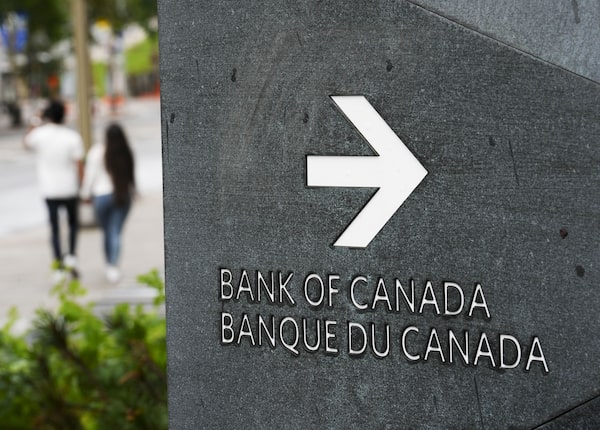
The Bank of Canada published a pair of quarterly surveys on Monday showing a sharp drop in business and consumer confidence about the economy as interest rates rise.Sean Kilpatrick/The Canadian Press
The majority of businesses and consumers expect that Canada will enter a recession in the next year, while most continue to believe inflation will remain elevated for several years – a challenging mix for the Bank of Canada that sets the stage for another large interest rate hike next week.
The Bank of Canada published a pair of quarterly surveys on Monday showing a sharp drop in business and consumer confidence about the economy as interest rates rise, hitting the housing market and reducing consumer spending power.
Both businesses and consumers said they expect inflation to remain high in the coming years. There were, however, some positive signs that conditions that are forcing price increases are easing for businesses, which suggest Canada is so far avoiding the worst-case scenario of a wage-price spiral.
The business outlook indicator, which captures how companies feel about future sales, investment and hiring, had its biggest quarterly drop since the early months of the COVID-19 pandemic. Companies connected with the housing sector were particularly downbeat. The survey of about 100 companies was conducted from mid-August to mid-September.
Canadian dollar gains as investors look to central bank survey for inflation clues
Ian McGugan: Are we on the brink of another financial crisis?
The consumer survey, conducted in mid-August, found that most respondents don’t think their wages will keep pace with inflation, and many have begun cutting back on spending. Nearly 80 per cent said the chance of a recession in Canada within the next year is at least 50 per cent.
The crucial metric for the Bank of Canada in both surveys is inflation expectations. What consumers and businesses believe about future price increases can affect the trajectory of inflation, as employees negotiate higher wages and companies raise prices to protect their profit margins. The central bank is worried that people will expect permanently high inflation, and price increases will become self-reinforcing.
The surveys show that inflation expectations remain high for both businesses and consumers. But there were some glimmers of hope, which could influence whether the Bank of Canada opts to increase interest rates 0.5 percentage points or 0.75 percentage points at its next decision on Oct. 26.
The average respondent to the business survey expects 4.26-per-cent inflation in two years time. That’s down slightly from July, but still far above the Bank of Canada’s 2-per-cent target. However, many firms said they expect key inflationary pressures to ease.
“For the first time in the past five quarters, businesses reported that their supply chains had improved compared with three months ago,” the Bank of Canada said. “Several firms – more than in recent quarters – noted an easing in labour market tightness. They described seeing a decline in competition for labour, including less poaching, compared with 12 months ago.”
Notably, companies said they expected to increase wages by an average of 4.9 per cent over the next year, down from 5.8 per cent in the previous quarterly survey. While this decline is not good news for workers whose wages aren’t keeping up with inflation, it will be received positively by the Bank of Canada, which is worried that the growth of wages will keep pushing up prices, particularly in the service sector.
“Businesses might be starting to tell the Bank of Canada what it wants to hear,” Royce Mendes, head of macro strategy at Desjardins, wrote in a note to clients. “While the balance of opinion among firms still pointed to labour shortages remaining a widespread issue, the intensity of those shortages has eased.”
The picture was less positive in the consumer survey. Short- and medium-term expectations of inflation continued to march higher, with the median respondent saying that inflation would be 7.1 per cent one year out, and 5.2 per cent two years out. In five years, they expected inflation to be 3.4 per cent, down slightly from the last survey.
While most consumers surveyed understand what the Bank of Canada is trying to achieve by increasing borrowing costs, the number of people who expect these actions to work declined, the central bank said.
“Canadians who aren’t familiar with the BoC’s inflation targeting think the target is upwards of 5 per cent, while even those who are familiar believe the target is close to 3 per cent,” Benjamin Reitzes, Bank of Montreal’s head of Canadian rates strategy, said in a note to clients. “If you’re looking for a reason for the BoC to remain very hawkish with its rhetoric, look no further.”
Consumer price index inflation has fallen in recent months, hitting 7 per cent in August from a four-decade high of 8.1 per cent in June. Statistics Canada will report September inflation data on Wednesday, which will tee up the Bank of Canada’s rate decision the next week.
Bank of Canada Governor Tiff Macklem has said several times in recent weeks that he expects to announce another rate hike. Royal Bank of Canada economist Claire Fan said that Monday’s reports are unlikely to change that path.
“Despite improving signs in today’s survey results, price pressures currently are still too high and broad to reverse quickly. And we don’t expect the Bank of Canada to ease off the monetary policy brakes until policymakers are confident that inflation will slow substantially and sustainably,” she wrote in a note to clients.
 Mark Rendell
Mark Rendell